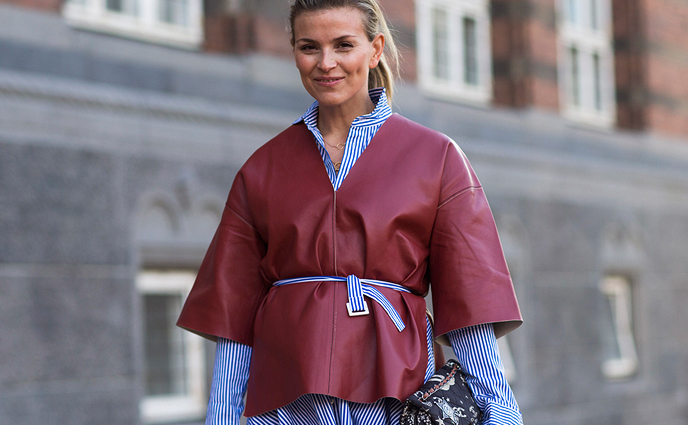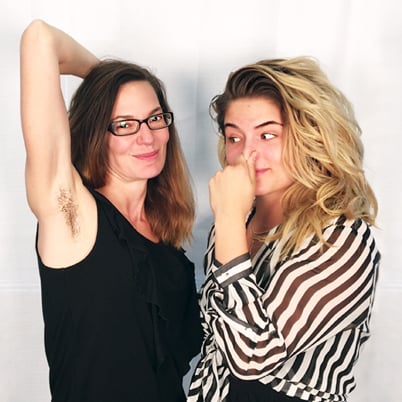Pregnant women react to the cocktail of hormones coursing through their veins in lots of different ways. Some spend their whole first trimester praying to the porcelain gods, others waltz through their entire pregnancy without a whiff of nausea. The results can be just as varied for your complexion.
"If a person has super dry skin, the extra oil production might help them. It might make the skin less dry and look better," says Sullivan. "For someone with average skin, the extra oil might cause problems and cause acne on face, back or hair-bearing areas. Even though it's the same physiological process, it can affect mothers differently."
It's possible your immune system shares some of the blame, too. Because the fetus has half of the father's make-up, your body may look at it like a bit of a foreign invader. "Your immune system goes through changes to tolerate pregnancy," Sullivan says. "Pregnant women are more susceptible to a number of infections. We see it with the flu and bladder infections, and for some people, acne is aggravated by bacteria on the skin. Skin bacteria gets in pores and makes it worse." In those women, the immune system's shifting tolerance could exacerbate acne.
"If a person has super dry skin, the extra oil production might help them. It might make the skin less dry and look better," says Sullivan. "For someone with average skin, the extra oil might cause problems and cause acne on face, back or hair-bearing areas. Even though it's the same physiological process, it can affect mothers differently."
It's possible your immune system shares some of the blame, too. Because the fetus has half of the father's make-up, your body may look at it like a bit of a foreign invader. "Your immune system goes through changes to tolerate pregnancy," Sullivan says. "Pregnant women are more susceptible to a number of infections. We see it with the flu and bladder infections, and for some people, acne is aggravated by bacteria on the skin. Skin bacteria gets in pores and makes it worse." In those women, the immune system's shifting tolerance could exacerbate acne.
I've always been an avid Googler, and my number of search queries has grown exponentially with each week of pregnancy. In the beginning, they all went something like this: "Is [fill in food, chemical or activity] safe for pregnancy?" This was no exception in my quest to treat my pregnancy acne. As a beauty editor I have literally dozens of skin care products at my disposal, and yet, I worried that I might be clearing my skin at the expense of the little dude residing in my uterus.
Though many of my pregnancy anxieties have been overblown, it turns out that a little bit of apprehension around what I was putting on my face was warranted.
"There have been no specific studies done on pregnant women and how much absorption [of topical skin care products] is seen through the skin into the bloodstream. All the recommendations are based on animal studies," explains Maryland-based dermatologist Elizabeth Tanzi, MD. "In general, we recommend being very cautious with skin care products during pregnancy because we just don't have a lot of hard, scientific facts, and it's better to be ultra-cautious."
Sullivan estimates that the absorption rate of most topical products is about 5 percent. "With that in mind, we strongly discourage the use of any retinoids, which unfortunately are really effective. Any absorption of those is thought to have a risk of birth defects."
Fortunately, you have other options. "Pregnant women can use glycolic acid-containing cleansers to help remove excess oil," suggests Tanzi. Shamban seconds this recommendation. "And treat it preventatively. Don't stop when the acne goes away," she adds. (When it comes to glycolic acid cleansers, I've had luck with Ole Henriksen Find Your Balance Oil Control Cleanser, $25, and I also like the incredibly gentle BeautyRx by Dr. Schultz Balancing Glycolic Cleanser, $25. Or try one of these hardworking glycolic acid products.)
Many experts agree that you can use acne-fighting standby salicylic acid without fear. However, I got mixed answers about benzoyl peroxide. Though Sullivan and my personal doctor say it's fine to use, both Tanzi and Shamban cautioned against it. Your best bet would be to hear out your own doctor.
Of course, you could forgo topical solutions altogether. "If breakouts are still a problem, gentle blue light treatments can be done in a dermatologists office that help to reduce acne in a gentle, chemical-free way," Tanzi says.
Though many of my pregnancy anxieties have been overblown, it turns out that a little bit of apprehension around what I was putting on my face was warranted.
"There have been no specific studies done on pregnant women and how much absorption [of topical skin care products] is seen through the skin into the bloodstream. All the recommendations are based on animal studies," explains Maryland-based dermatologist Elizabeth Tanzi, MD. "In general, we recommend being very cautious with skin care products during pregnancy because we just don't have a lot of hard, scientific facts, and it's better to be ultra-cautious."
Sullivan estimates that the absorption rate of most topical products is about 5 percent. "With that in mind, we strongly discourage the use of any retinoids, which unfortunately are really effective. Any absorption of those is thought to have a risk of birth defects."
Fortunately, you have other options. "Pregnant women can use glycolic acid-containing cleansers to help remove excess oil," suggests Tanzi. Shamban seconds this recommendation. "And treat it preventatively. Don't stop when the acne goes away," she adds. (When it comes to glycolic acid cleansers, I've had luck with Ole Henriksen Find Your Balance Oil Control Cleanser, $25, and I also like the incredibly gentle BeautyRx by Dr. Schultz Balancing Glycolic Cleanser, $25. Or try one of these hardworking glycolic acid products.)
Many experts agree that you can use acne-fighting standby salicylic acid without fear. However, I got mixed answers about benzoyl peroxide. Though Sullivan and my personal doctor say it's fine to use, both Tanzi and Shamban cautioned against it. Your best bet would be to hear out your own doctor.
Of course, you could forgo topical solutions altogether. "If breakouts are still a problem, gentle blue light treatments can be done in a dermatologists office that help to reduce acne in a gentle, chemical-free way," Tanzi says.
Another hard truth about pregnancy: Even if you make it through your first -- or even second -- trimester unscathed by acne, other skin woes may threaten to snatch your pregnancy glow. Though my pregnancy acne sorrows mostly subsided by 17 or 18 weeks (thanks in part to hormones and in part to a healthy regimen of glycolic acid cleansing, I suspect), I noticed two small, faint splotches of discoloration blooming on my cheeks at around 26 weeks (so yeah, still not glowing).
Melasma, or pregnancy mask, is another issue that seems to disproportionately plague expectant moms. It's a form of hyperpigmentation that looks like light or dark brown patches on your face. "About 50 pregnant of pregnant women have some form of melasma. Some people get a few spots, for others it's severe," Sullivan says. In other words, it can range from small splotches to large swaths covering the face.
Like pregnancy acne, melasma is caused in part by our old pal, pregnancy hormones. "Pigment cells called melanocytes are very active during pregnancy so when they are exposed to sun, they overproduce pigment," says Tanzi. Because the sun also plays a role, this is why you'll see melasma more commonly on the face, as opposed to less exposed parts of your body.
Image via Getty
Melasma, or pregnancy mask, is another issue that seems to disproportionately plague expectant moms. It's a form of hyperpigmentation that looks like light or dark brown patches on your face. "About 50 pregnant of pregnant women have some form of melasma. Some people get a few spots, for others it's severe," Sullivan says. In other words, it can range from small splotches to large swaths covering the face.
Like pregnancy acne, melasma is caused in part by our old pal, pregnancy hormones. "Pigment cells called melanocytes are very active during pregnancy so when they are exposed to sun, they overproduce pigment," says Tanzi. Because the sun also plays a role, this is why you'll see melasma more commonly on the face, as opposed to less exposed parts of your body.
Image via Getty
Though sometimes melasma will disappear on its own, it can be a lot trickier to manage than pregnancy acne. "The melanocytes are finicky and deep in the skin. They don't respond as well to topical treatment. There are few ways to reliably treat melasma," Sullivan says.
Moms-to-be should definitely steer clear of products containing hydroquinone, a common brightening agent. While studies haven't found a correlation between hydroquinone and birth defects, research indicates that the body absorbs around 35 to 45 percent of topical hydroquinone, making it much riskier to use than ingredients that are absorbed at a much lower rate.
Your best bet? Focus on preventing melasma by being exceptionally cautious with sun exposure. "Wear a heavy sunscreen -- the kind that makes your face white -- when you're outdoors," Shamban says. (Though it won't make your face white, I like Isdin Eryfotona Actinica Ultralight Emulsion SPF 50+, $50, for its high SPF and lightweight mineral formula, but here are a bunch of other great mineral sunscreen options).
And think beyond the beauty counter. "The best defense for hyperpigmentation during pregnancy is a hat because even sunscreen will allow melasma to develop," Tanzi adds. "Always wear a hat when in the sun during pregnancy." (We're a fan of these stylish sun hats.)
Additionally, glycolic acid may further cement itself as your skin's new BFF, as it's another safe way to help even out your skin tone during pregnancy. After you've made it through your pregnancy, Sullivan says you can consider more aggressive treatments, like chemical peels and lasers -- one of which I hope to have time to book somewhere between picking out a daycare and sending the little one off to college.
Moms-to-be should definitely steer clear of products containing hydroquinone, a common brightening agent. While studies haven't found a correlation between hydroquinone and birth defects, research indicates that the body absorbs around 35 to 45 percent of topical hydroquinone, making it much riskier to use than ingredients that are absorbed at a much lower rate.
Your best bet? Focus on preventing melasma by being exceptionally cautious with sun exposure. "Wear a heavy sunscreen -- the kind that makes your face white -- when you're outdoors," Shamban says. (Though it won't make your face white, I like Isdin Eryfotona Actinica Ultralight Emulsion SPF 50+, $50, for its high SPF and lightweight mineral formula, but here are a bunch of other great mineral sunscreen options).
And think beyond the beauty counter. "The best defense for hyperpigmentation during pregnancy is a hat because even sunscreen will allow melasma to develop," Tanzi adds. "Always wear a hat when in the sun during pregnancy." (We're a fan of these stylish sun hats.)
Additionally, glycolic acid may further cement itself as your skin's new BFF, as it's another safe way to help even out your skin tone during pregnancy. After you've made it through your pregnancy, Sullivan says you can consider more aggressive treatments, like chemical peels and lasers -- one of which I hope to have time to book somewhere between picking out a daycare and sending the little one off to college.





